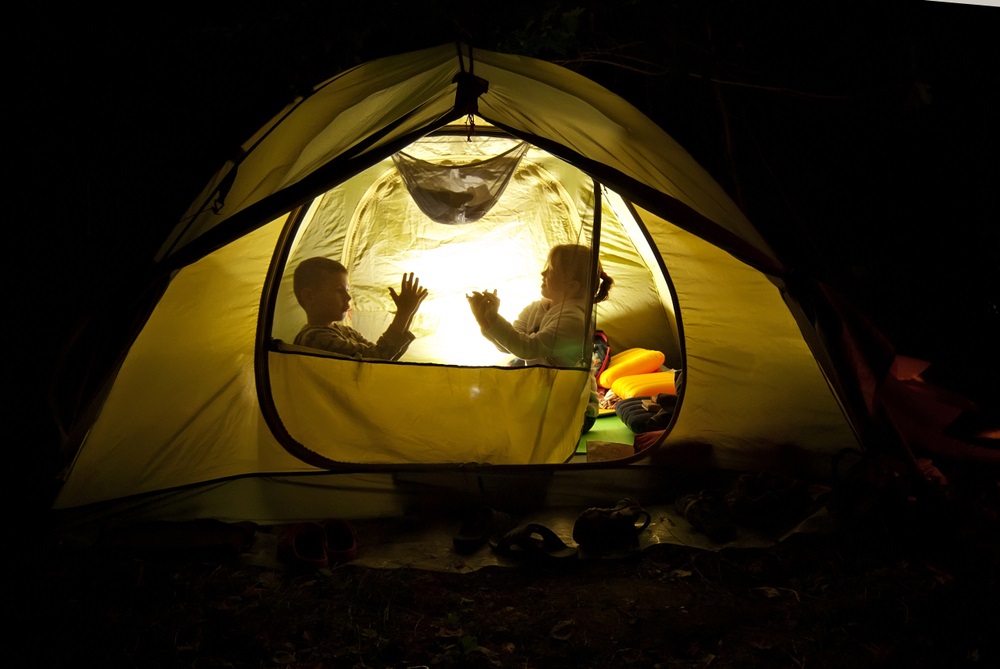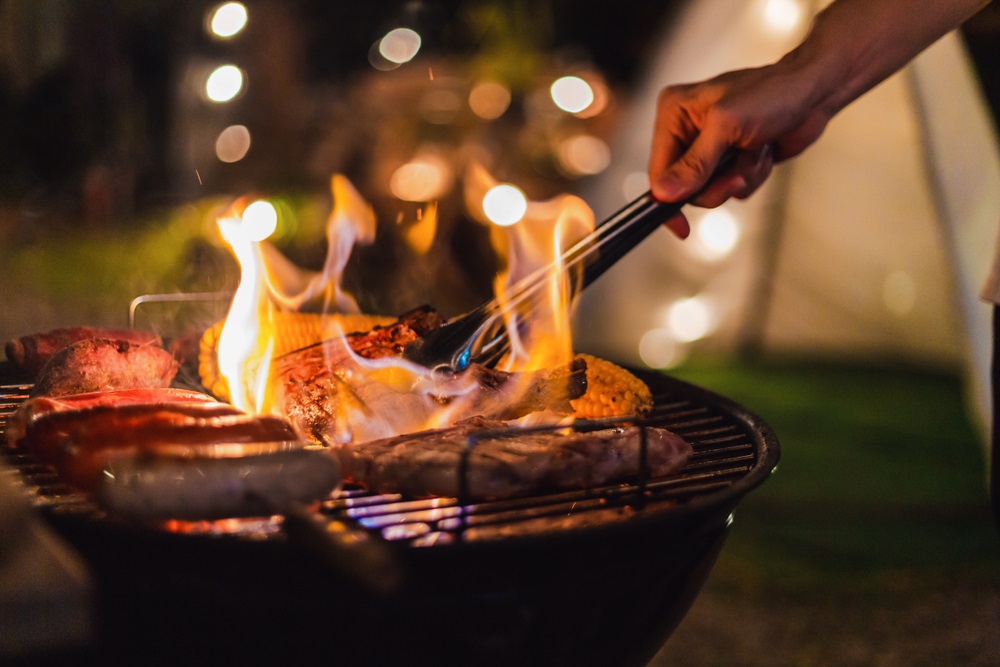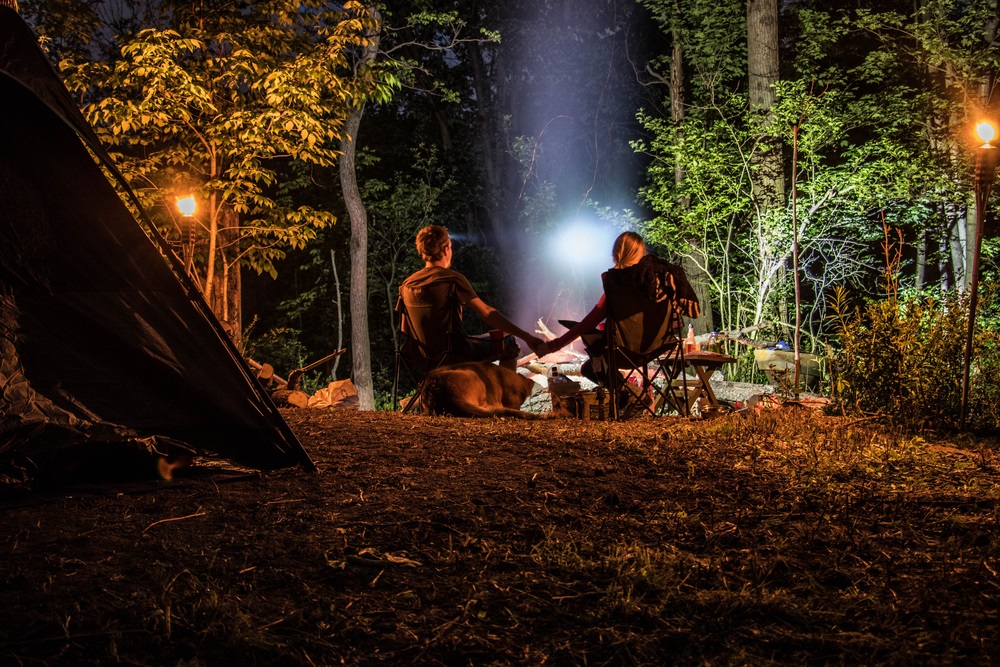These days, I’ve heard a lot of friends complaining about not having enough time to prepare or test their survival skills. They say there’s just no time left in their busy lives to go out in nature and increase their personal survival knowledge.
However, as I’ve told them a couple of times, the solution to their problems is waiting for them in their own backyard. In fact, they could create a survival camp without having to get out of the neighborhood. This is a viable solution for all busy folks that want to get prepared but are constantly struggling with the rat race.
Think of it like this, if you create a backyard camp, not only can you practice your skills, but you can also teach your loved ones the art of survival without having to take some time off or dealing with the expenses of travel.
Even more, in case something goes wrong, you are within reach of everything you might need to make your experience more comfortable. This is extremely useful since not all children may want to experience a night of camping during a storm or where the temperature drops below their comfort level.
A backyard camp can become a powerful learning tool for your children, besides providing you with various ways to test your equipment and skills. However, in my opinion, it is also a safe option to taste the skills and endurance of your loved ones so that you know what you will have to deal with in case the brown stuff hits the fan.
What is a backyard camp?
To put it simply, it’s not just a way to enjoy a night out “in nature” with your children while recreating (or mimicking) the living conditions of a wilderness campsite, but it’s also a form of preparedness that would help you in case something happens, and your home becomes unlivable.
If there’s no power and no gas, you will be forced to live in your backyard camp. If you did your homework and planned for this, you should have no problem surviving until things get back to normal. By using your backyard to set up a camp and test your survival skills without the aid of modern appliances and the items you have stored in your home, you can prepare for times when your backyard camp won’t be just a training facility.

Your backyard survival camp will need everything you would use in the woods, and it needs to become self-sustaining. This means you will need to have a shelter, ways to cook, a way to wash, and also a supply of water, food, and other items. Not to mention that you will also probably need some tools.
The good news is that you probably already have all that’s needed if you are a prepper, and your garage and storage areas are already packed with whatever you may need. If you’re not a prepper, I guarantee that your first backyard camp experience will teach you what you need to get/store and will provide a valuable lesson for your preparation plan.
The beauty of the backyard camp is that you can use it not only by yourself, but it can also test your skills with family or friends for as long as you think it might help you figure out more about them. Now, let’s look at each part of your backyard camp.
The shelter
For most people, their shelter is just a simple pop-up tent they’ve purchased for their annual camping trip. If that’s the case for yourself, you will need to find a place in your yard to place that tent, even if you don’t plan to keep it up for long.
If you have a tent that has been sitting in the garage for a long time, you might discover that your tent has degraded, and it may fall apart when you try to use it. If you have a brand-new tent that you’re dying to try, place it in a shaded area in your backyard and let it sit for a long time, regardless if you use it or not, to see how well it can withstand the elements.
For example, nylon tents do not last long in the sun, and they begin to degrade, and you might want to treat the fabric with certain products (available on the market) to protect it from UV rays.
A backyard camp provides the perfect opportunity to test the limits of your tent, and it should be used for sleeping but also as a temporary shelter if it’s raining and snowing outside. If it fails to provide adequate protection, you can always go inside. Not to mention that during rainy/snowy days, you will discover how long your kids will last inside the tent without their toys, gadgets, or whatever other items keep them busy for hours.
Besides using a tent, you can also experiment with other sheltering construction methods. For example, a tarp can be used to make various types of shelters as long as you have some cordage and supports in your vicinity (trees, fence, etc.), but even some tent pegs to tie it to will do a great job.
With the available shelter in your backyard camp, you will discover how comfortable it can be, how many people it can accommodate, and how much protection and warmth it can provide.
Cooking
Cooking outside is a pleasant experience for me, regardless if I’m using a grill placed on rocks, a can stove, or a solar oven. During your backyard survival experience, you could experiment with whatever means you have available to cook your food or make water potable.
You will learn two important things that will help you become better prepared. One, you will find out that you will need a supply of fuel, regardless if you are using firewood, coals, or modern fuel that comes neatly packed (like butane gas cartridges). And two, you will find out that you need to use your resources efficiently and that it takes quite some time to cook food using various methods.
After the first cooking experience, you may discover that you are using more fuel than is needed, and for example, a lot of firewood is wasted during camping cooking because it’s hard to predict how much is needed to prepare various meals.

In my case, when I spend time in the great outdoors during my long camping trips, I’ve learned to use the resources as best as I can. For example, after I prepare a meal, I use the remaining ambers or burning wood to boil water for the next days. I have a few collapsible bottles that I fill with water and place in my tent. I have water for drinking, and when I prepare my dinner, I also have hot water that can keep me warm at night. This not only helps me use the resources properly, but it also helps me save time, as I don’t have to look for firewood too often.
Also, if you experiment with various cooking methods, you will learn how much time it takes to prepare a meal. Cooking over an open fire is a much better choice than using a solar oven if your kids are hungry. It’s faster and easier for some.
On the other hand, you need to stay close to the cooking area, and you won’t have time to do other stuff. If you know how much time it takes to cook various foods using a solar oven, you could set it in place long before you plan on eating, and while the food cooks, you will have time to do other chores.
How about if it rains? You can imagine that using a solar oven is out of the question, and you need to find ways to make a fire and protect it from rainfall. It may be difficult to even start the fire if you didn’t store the firewood properly and it got wet. Luckily, you have a butane gas cartridge that can be used on rainy days. If not, you will need to eat foods that require no cooking.
As you can see, every option has its pros and cons, and you can learn about these only by exterminating. Cooking food outside may sound simple enough, but with each experience, you will learn new things that will help you prepare better.
Cleaning and hygiene
You will need to stay clean but also wash food, dishes, and clothes. This means you need to have the means and resources to do so, and in the wilderness, it might be easy to stay clean and maintain good hygiene if you have a water source nearby. If you don’t have a water hole in your vicinity, you will need to learn to collect as much water as you can and haul water back to your camp over long distances.
Luckily, in your backyard, you have access to a functional water source, and your backyard survival camping experience will become less of a hassle. However, I recommend you follow two approaches when it comes to your water needs for cleaning and hygiene.
First, you can use tap water for whatever chore you need to do and see how effectively you can use the water, but also how much water you need for various chores. This will help you establish your actual water needs during a survival scenario, even though sometimes your calculations may not be accurate since you tend to overuse the infinite water supply.
And second, close the tap water and use water only from your stash and the water you manage to gather. If you use the water from your storage, the psychological factor comes into play once you have a visual of the amount of water available (or the remaining amount). The reality may not settle too fast in the beginning, but the more water you use, the more you will realize the situation you find yourself in.
I guarantee that 90% of people will tend to use water like in the first approach, not realizing (at first) that it’s a finite resource. Once they go through half of their water storage and they realize how easy water can be wasted, only then will they start to think of that scenario when “what if I run out of water.”
Since we live in an advanced society, we are not used to regulating our resources, and honestly, most people won’t even know how to do that if they are forced to use a limited amount of, well, pretty much anything.
I recommend you try using only your stored water supply and see how well you can use it and how long it will last. Also, don’t wait to run out of water and think of ways to gather water either from rainfall, solar stills, or any other method you can think of.
Besides covering your water needs, you will also have to think of ways to clean your dishes, clothes, and yourself. You will need recipients for cleaning dishes and clothes, but you also need to learn how to use as little water as possible. For example, dishes and cooking pots/pans can be scrubbed with sand or ash to remove food residue and then use only a limited quantity of water to rinse them.
For clothes, there are ways of cleaning the clothes without using too much water. In regions where water is scarce, people will let the clothes sit in the sun, scrub the dirt with brushes and soak them in water just enough for the remaining dirt and oils to wash away, and then air dry them.
Also, regarding your soap needs, there are various ways to wash your items and yourself without the need to use the classic soap bar. Sure, you can make soap using fat and ashes, but you can also use natural alternatives. In a book I’m launching this year, I’m teaching people how to use plants for their personal hygiene needs. For example, there are many plants that can be used as a soap substitute, and every region in North America has its fair share of plants containing saponins.
Regarding the dirty business, you will have to improvise a toilet and place it in the proper location that keeps the human waste from contaminating the other areas of your backyard camp but also provides enough privacy for the user.
The most common improvised toilet is the bucket with a toilet seat cover. The bucket is lined with a resistant plastic bag, and wood chips or shavings are added to the bucket after each use. You could also dig a latrine, but for most folks, a bucket toilet is the simplest DIY method for taking care of their business.
Other recommendations
Now, each backyard camp will have its limitations and special requirements, and these factors are mostly dependent on the region you live in, the number of people in your family, and your level of preparedness (or the absence of it).
You will discover that you lack a lot of things during your first backyard camping experience, but rather than going inside your home and getting what you need, I advise you to figure out ways to do things without those items. It will put your knowledge and skills to the test and is a valuable lesson for the next “camping trips.”
Also, I strongly encourage you to do the first runs by yourself, and only after that should you get others involved (family, friends, etc.) It will help you prepare better, and you will have learned what is needed/expected of you once others become part of your experiment.
Some may decide to involve everyone in the first run to test the waters, and from their point of view, it makes sense. You might learn what went wrong and what you could have done better, but it can also backfire. If you want to get everyone on board, you should be prepared to meet all their needs (or most of them) if the SHTF and your backyard camping is no longer an experiment but the reality of daily living.
If you all suffer together, they may lose confidence and may not want to repeat the experience. Also, as the head of the family, chances are they will think everything it’s in vain if things don’t go as planned and if you, their protector, didn’t manage to provide for them. They may end up seeing your preparedness plans as nothing more than a waste of time. This is also a matter of communication and family bonding, but that’s another topic.
Lastly, I recommend you take notes after each backyard camping routine and check those notes every time you change your plans. Also, feel free to share your lessons with others in your network and learn from their experiences if they are like-minded people.
I hope you will enjoy your backyard camping adventure, and may your experience help you become better prepared!






















































































